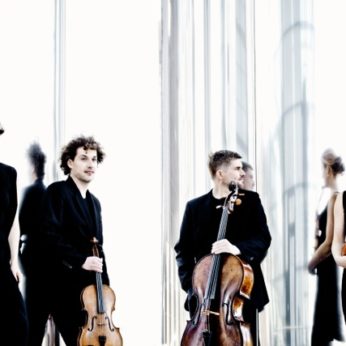Composer: Thomas Adès (b. 1971)
Performance date: 03/07/2015
Venue: St. Brendan’s Church
Composition Year: 1993
Duration: 00:18:37
Recording Engineer: Richard McCullough, RTÉ lyric fm
Instrumentation Category:String Quartet
Artists:
Signum Quartet (Kerstin Dill, Annette Walther [violins], Xandi van Dijk [viola], and Thomas Schmitz [cello]) -
[quartet]

Thomas Adès is one of
leading contemporary composers. His Second Quartet, The Four Quarters, was commissioned by Carnegie Hall for the
Emerson Quartet. Adès was also Artistic Director of the Aldeburgh Festival for
nine years.
Arcadiana is his
first string quartet, composed when he was in his early twenties for the Endellion
Quartet, who commissioned it to premiere at the Cambridge Elgar Festival. His Opus
1 was a spectacular setting of poems by T.S.Eliot and this afternoon’s work
borrows that poet’s magpie technique, used to such effect in The Waste Land ,of quoting both styles
and phrases from his literary heroes. Their purposes however seem different for
Eliot employed images of the past to emphasize the aridity of the present,
whereas Adès seeks merely to evoke images
associated with the ideas of the idyll, vanishing, vanished, or imaginary,
an aura of fin-de-siècle retrospection. The power of these images is taken from
Poussin’s Et in Arcadia ego, where a
quartet of youthful shepherds decipher the titular inscription on a tomb, Even in Arcadia I, Death, am present.
The seven movements are played without a break beginning
with a mysterious Venetian nocturne, visions of rocking gondolas, lugubrious
gondoliers, crumbling palaces and maybe a Tononi violin. Pappageno’s silver
bells evoke the power of music followed by a more stringent recall of Schubert
Lieder. Poussin’s vision, central to the work, is reflected through a brutal
tango, a modern dance of death. A sea journey and Debussy’s L’Isle Joyeuse are conjured by the fifth
movement. Nostalgic homage is paid to Elgar by the seventeen bars in Nimrod’s
key of E flat, the
Blake to the feast. The mystery of the opening is returned to along with the waters
of oblivion in the final movement, all ending appropriately in mid-phrase.
Copyright © 2025 West Cork Music. All rights reserved.
Designed and developed by Matrix Internet